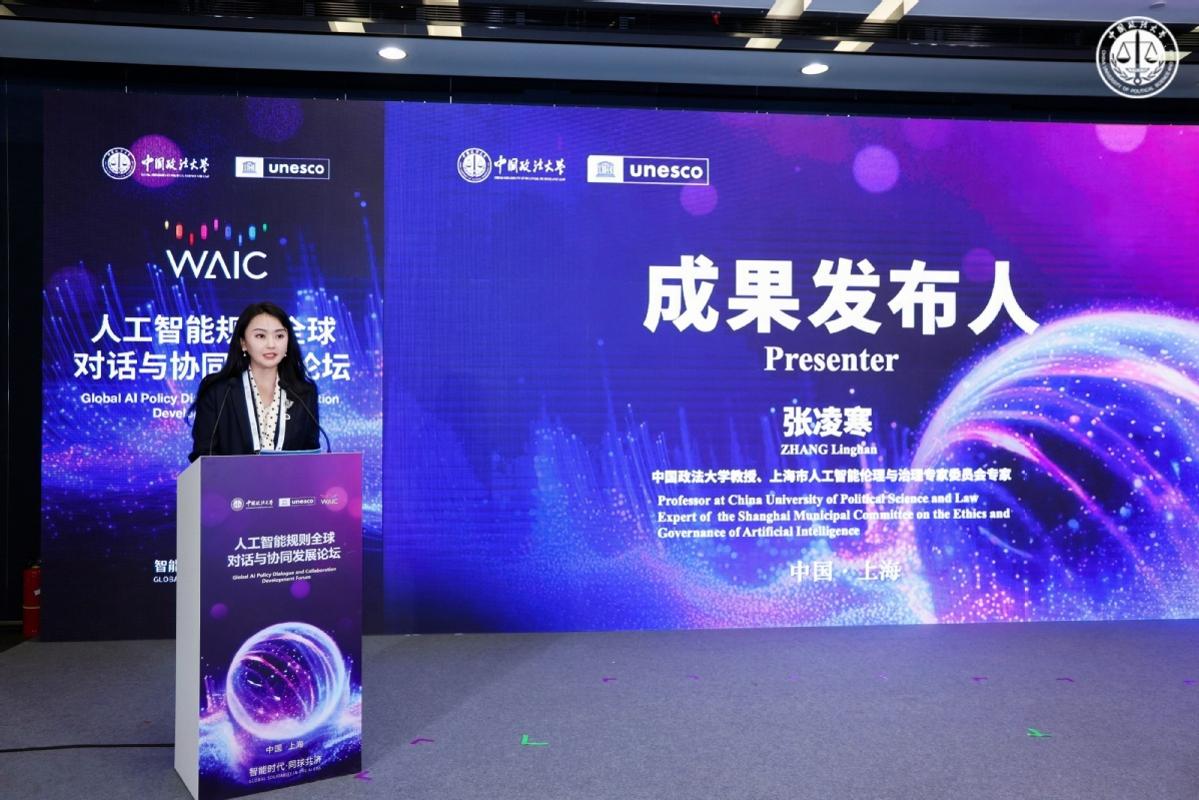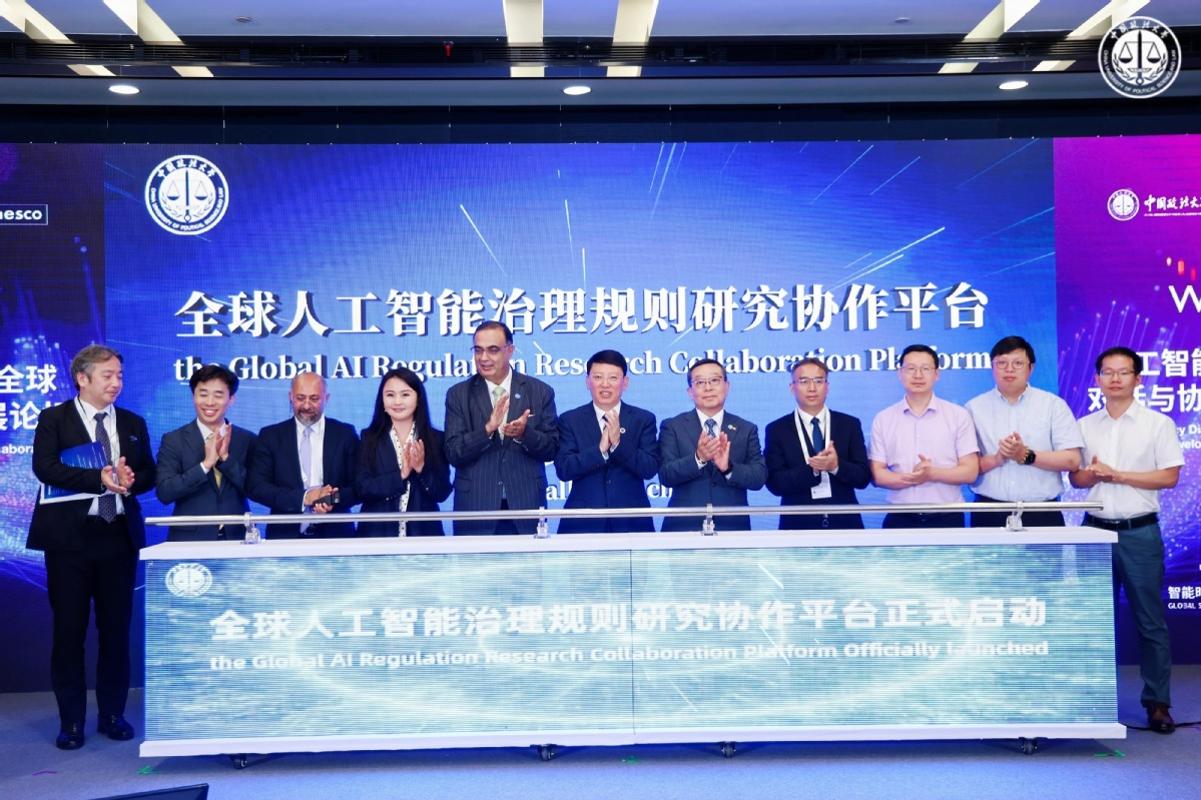
Two key outcomes — the "Global AI Governance Rules Map 2025" and "Global AI Governance Regulation Collaboration Research Platform" — were launched at the 2025 World Artificial Intelligence Conference (WAIC) in Shanghai on Sunday. [Photo provided to chinadaily.com.cn]
Two key outcomes — the "Global AI Governance Rules Map 2025" and "Global AI Governance Regulation Collaboration Research Platform" — were launched at the 2025 World Artificial Intelligence Conference (WAIC) in Shanghai on Sunday, aiming to tackle global AI governance challenges and advance international coordination.
The unveiling came during the Global AI Policy Dialogue and Collaboration Development forum, a WAIC 2025 highlight co-hosted by China University of Political Science and Law (CUPL) and United Nations Educational, Scientific and Cultural Organization (UNESCO). The two research outputs led by CUPL Professor Zhang Linghan, were designed to provide critical support for addressing fragmented global AI governance and promoting cross-border collaboration.

Two key outcomes — the "Global AI Governance Rules Map 2025" and "Global AI Governance Regulation Collaboration Research Platform" — were launched at the 2025 World Artificial Intelligence Conference (WAIC) in Shanghai on Sunday. [Photo provided to chinadaily.com.cn]
Jiang Zeting, chair of the university council of CUPL, emphasized that AI's borderless nature makes single-country governance insufficient to tackle global risks, potentially fueling international competition over rules. "Countries' regulatory frameworks are growing fragmented, creating barriers for cross-border tech collaboration," he said, noting that cultural and value differences have hindered consensus on algorithm ethics, worsening trust issues. "Cross-border data flows face structural barriers amid balancing national security, privacy, and commercial interests, making multilateral talks critical to finding common ground on AI's global challenges."
The Global AI Governance Rules Map 2025 is an interactive platform that integrates multi-source data — including legislation, cases, strategies and guidelines — into an interactive world map, breaking down isolated rules to enable visibility, connectivity and practical use. Covering key areas like tech innovation, data security, culture, education, and climate protection, the platform updates new rules within 72 to 96 hours with translation and annotation. Available in Chinese and international versions, it supports title or full-text searches and one-click filtering by authority, region or rule type.

Two key outcomes — the "Global AI Governance Rules Map 2025" and "Global AI Governance Regulation Collaboration Research Platform" — were launched at the 2025 World Artificial Intelligence Conference (WAIC) in Shanghai on Sunday. [Photo provided to chinadaily.com.cn]
Building on a domestic research network, the Global AI Governance Regulation Collaboration Research platform has expanded internationally, establishing nodes across continents and engaging leading global experts. It aims to pool global wisdom for inclusive, consensus-based governance frameworks, extending to representative countries and regions.
Shahbaz Khan, director and representative of UNESCO regional office for East Asia, highlighted that over 2 billion people — 70 percent in Africa — lack access to internet infrastructure. He stressed the need to include these populations to "unlock their potential and leave no one behind", adding that AI must empower humanity under the premise of ethics and fairness. Citing the UN Global Digital Compact and China's initiatives, he noted that the path ahead is challenging but crucial.

Two key outcomes — the "Global AI Governance Rules Map 2025" and "Global AI Governance Regulation Collaboration Research Platform" — were launched at the 2025 World Artificial Intelligence Conference (WAIC) in Shanghai on Sunday. [Photo provided to chinadaily.com.cn]
Mehdi Snene, senior adviser to the UN Secretary-General's Special Envoy for Digital and Emerging Technologies, pointed out that most AI development is concentrated in high-income countries, with systems focused on Western societies while neglecting regions like Africa. This, he explained, risks cultural homogenization and even "AI colonialism", marginalizing minority groups. "AI development and governance must address these disparities to ensure an equitable, AI-driven future," he emphasized.
Mohamed Farahat, a member of UNESCO's global network of experts on AI and the rule of law, underscored the need for legal frameworks and accountability mechanisms in AI governance, with all parties taking responsibility. He noted that African countries have begun adopting national AI strategies, with regional development — such as building AI-enabled societies — on the horizon. "Amplifying the voices of the Global South will strengthen AI governance," he said.
By He Qi in Shanghai | chinadaily.com.cn
《CHINADAILY中国日报网》2025年7月28日
链接:Conference emphasizes need to bolster cross-border AI governance - Chinadaily.com.cn
